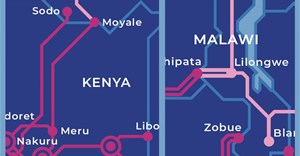Spearheading digital transformation in East Africa

GE is bringing new digital infrastructure solutions to the Kenyan market by connecting software, apps and analytics to industrial businesses, enabling them to operate faster, smarter and more efficiently.
The event gathered key players in the digital space including GE Digital experts, Microsoft, Safaricom, iHub and Seven Seas, for stakeholder panel discussions on the importance of digital industrial transformation in Africa to unlock the region’s digital future.
What is industrial data?
Industrial machines are not known to produce, share and capture data in a manner that can enable companies to understand them better, predict their defects and optimise their performances. GE is leading a whole new sector of technology which consists of enabling machines to connect to multiple other applications and platforms, as well as to send and receive massive amounts of data through the cloud/internet, making it possible to understand, operate, improve and service them remotely.
Digital industrial revolution in East Africa
Industries such as aviation, healthcare, mining, oil and gas, power generation, and transportation represent upwards of 30% of the global economy, and touch the lives of almost everyone on the planet. These capital-intensive industries have long-lived assets such as aircraft, generators, locomotives, and turbines that are mission-critical and require considerable monitoring and service throughout their 20 to 50-year lives. A “big data” platform that brings new value to the wealth of data coming from these assets, their processes, and the enterprises in which they exist, will set the stage for a new wave of productivity gains and information-based services.
Industrial data is growing twice as fast as any other sector. Yet today, less than 3% of that data is tagged and used in a meaningful fashion. The digital industrial revolution is poised to radically reshape how we produce, distribute and maintain physical assets—from gas turbines to entire manufacturing plants. A growing, regional network of connected assets, designed to apply split-second machine learning to big data, the digital industrial revolution will help local businesses extract valuable insights from assets to transform operations, enable innovation and explore new business models.
GE is bringing new digital infrastructure solutions to the Kenyan market by connecting software, apps and analytics to industrial businesses, enabling them to operate faster, smarter and more efficiently. In Sub-Saharan Africa, the company is pioneering technologies to help companies capitalize on the Industrial Internet, fuelling productivity and value from existing assets and enabling new business models and growth potential.
Business innovation
At the event, Getty Melaku the chief financial officer for GE Africa said: “We are excited to bring our cutting edge digital solutions and expertise to Kenyan businesses to optimise operational and business innovations for increased productivity and profit. We see a huge opportunity for Kenya and the continent at large to benefit from the digital industrial revolution and leap-frog existing industrialisation models, and quickly improve competitiveness in the global economy”.
Thanks to technological advances, GE can optimise operations to improve asset performance while keeping costs down. This is why combining software and data analytics with machines’ hardware has become so important, including in Africa.
“The digital industrial revolution is both a cultural and technology shift and companies that don’t evolve, will fail to deliver critical business outcomes and stunt their productivity gains. Our customers in Africa demand the same equipment performance as the rest of the world and are constantly looking at ways to enhance asset performance. Forty of GE’s oil and gas customers in Africa are using digital solutions to optimise operations,” said chief information officer for GE Africa, Abu Sulemana.
GE has incorporated learnings from its extensive industrial business processes to release ‘Predix’ the world's first industrial operation system which powers the modern digital industrial businesses. GE is committed to empowering organisations enter a new era of industry digitisation. Local businesses will be able to create innovative apps on Predix that turn real-time operational data into actionable that can deliver outcomes across many different industries. These outcomes range from the reduction of unplanned downtime to improved asset output and operational efficiency.
Job creation from industrial digitisation
According to a report by the World economic forum, there is significant opportunity in the electricity sector for digitisation to create jobs. Digital initiatives will create up to 3.45 million new jobs between 2016 and 2025 - translating to 10.7% job growth in the electricity industry. Job creation potential is highest in the consumer renewables sector, with energy storage integration creating up to 1.07 million new jobs.
New jobs in smart asset planning (925,000 new jobs) and asset performance management (596,000) more than address job loss from automation or more efficient technologies. A significant problem that utilities are facing is an ageing workforce, with a weak pipeline of new talent and a potential productivity gap as new employees are recruited and trained. Digital initiatives go some way in ensuring that experience is captured as the workforce retires, with significant productivity gains expected.
Source: African Press Organisation

APO is the sole press release wire in Africa, and the global leader in media relations related to Africa. With headquarters in Dakar, Senegal, APO owns a media database of over 150,000 contacts and the main Africa-related news online community.
Go to: www.bizcommunity.com/PressOffice.aspx?cn=apogroup






















